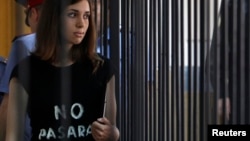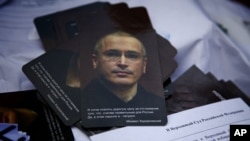MOSCOW —
Human rights advisers to President Vladimir Putin on Wednesday criticized his proposal to free some prisoners on the 20th anniversary of Russia's constitution, arguing it was far too limited to help ease social tensions.
Putin's amnesty would include the crime of 'hooliganism' and could lead to the early release of two jailed members of female punk band Pussy Riot, convicted on that charge for performing an anti-Kremlin 'punk prayer' in a Moscow cathedral.
But members of Putin's advisory council on human rights said the draft, which the Kremlin sent to parliament on Tuesday, would free a relatively small number of inmates.
Several people whom Kremlin critics consider political prisoners, including ex-oil tycoon Mikhail Khodorkovsky, would remain behind bars. And there would be no clemency for most of those prosecuted for mass protests against Putin on the eve of his third presidential inauguration last year.
The scale of the amnesty will be a measure of Putin's tolerance for dissent as Russia prepares to host the Winter Olympics in Sochi in less than two months' time - an event that has focused international attention on his human rights record.
A total of 1,335 convicts, or just half of a percent of those jailed in Russia at present, would be allowed to walk free, said Andrei Babushkin, a member of the rights council.
The proposal fails to “restore trust in the authorities among the part of the society that is most critical about them”, he said.
On Wednesday rights activists filed a request with the Duma, parliament's lower chamber, for a wider amnesty, and backed it with 20,000 signatures collected from citizens.
“Of course we are happy for every freed person but we would like the amnesty to affect all political prisoners, not just some,” said veteran activist Lyudmila Alexeyeva, who has quit the council in protest over Putin's human rights policies but goes on cooperating with the panel.
Rising discontent
In late 2011 and in 2012, Putin faced the largest wave of street protests against his rule since he first rose to the presidency in 2000. He is still Russia's most popular politician but his ratings have slumped over the years and he faces growing discontent in society, mainly among the affluent urban elite.
The Kremlin has portrayed the amnesty as a humanitarian act to help re-unite families, as it encompasses people like young offenders, mothers of young children, pregnant women and the elderly.
But it would also benefit some military personnel, law enforcement officials and prison workers who abused their roles - a sensitive issue in a country where the opposition accuses Putin of using Russia's justice system to persecute opponents.
Another member of the human rights council, Igor Pastukhov, said: “This draft deprives us of the opportunity to ease tensions in society.”
But the draft is expected to easily win the necessary Duma approval without major changes, since the chamber is dominated by a party loyal to Putin.
Pussy Riot's Maria Alyokhina and Nadezhda Tolokonnikova - among the most prominent prisoners who could be freed under the amnesty - could be out of jail by Jan. 1, a lawyer for Tolokonnikova said. They are otherwise due for release in March.
Environmental group Greenpeace said on Wednesday that under the current wording, the amnesty would be unlikely to benefit 30 people charged over a September protest against Russian oil drilling in the Arctic.
It would also have no effect on anyone convicted of financial crimes, meaning Khodorkovsky would remain in jail and opposition leader Alexei Navalny, who was given a five-year suspended sentence in July after a theft trial he called politically motivated, would not benefit.
Former Constitutional Court justice Tamara Morshchakova, who now also serves on Putin's rights council, said the proposal would affect some 20,000 people in total. That figure includes people with suspended sentences and some who are being prosecuted or are standing trial but have not been convicted.
The Kremlin denies clamping down on opponents or using the courts against them. Putin has repeatedly said there are no political prisoners in Russia.
Putin's amnesty would include the crime of 'hooliganism' and could lead to the early release of two jailed members of female punk band Pussy Riot, convicted on that charge for performing an anti-Kremlin 'punk prayer' in a Moscow cathedral.
But members of Putin's advisory council on human rights said the draft, which the Kremlin sent to parliament on Tuesday, would free a relatively small number of inmates.
Several people whom Kremlin critics consider political prisoners, including ex-oil tycoon Mikhail Khodorkovsky, would remain behind bars. And there would be no clemency for most of those prosecuted for mass protests against Putin on the eve of his third presidential inauguration last year.
The scale of the amnesty will be a measure of Putin's tolerance for dissent as Russia prepares to host the Winter Olympics in Sochi in less than two months' time - an event that has focused international attention on his human rights record.
A total of 1,335 convicts, or just half of a percent of those jailed in Russia at present, would be allowed to walk free, said Andrei Babushkin, a member of the rights council.
The proposal fails to “restore trust in the authorities among the part of the society that is most critical about them”, he said.
On Wednesday rights activists filed a request with the Duma, parliament's lower chamber, for a wider amnesty, and backed it with 20,000 signatures collected from citizens.
“Of course we are happy for every freed person but we would like the amnesty to affect all political prisoners, not just some,” said veteran activist Lyudmila Alexeyeva, who has quit the council in protest over Putin's human rights policies but goes on cooperating with the panel.
Rising discontent
In late 2011 and in 2012, Putin faced the largest wave of street protests against his rule since he first rose to the presidency in 2000. He is still Russia's most popular politician but his ratings have slumped over the years and he faces growing discontent in society, mainly among the affluent urban elite.
The Kremlin has portrayed the amnesty as a humanitarian act to help re-unite families, as it encompasses people like young offenders, mothers of young children, pregnant women and the elderly.
But it would also benefit some military personnel, law enforcement officials and prison workers who abused their roles - a sensitive issue in a country where the opposition accuses Putin of using Russia's justice system to persecute opponents.
Another member of the human rights council, Igor Pastukhov, said: “This draft deprives us of the opportunity to ease tensions in society.”
But the draft is expected to easily win the necessary Duma approval without major changes, since the chamber is dominated by a party loyal to Putin.
Pussy Riot's Maria Alyokhina and Nadezhda Tolokonnikova - among the most prominent prisoners who could be freed under the amnesty - could be out of jail by Jan. 1, a lawyer for Tolokonnikova said. They are otherwise due for release in March.
Environmental group Greenpeace said on Wednesday that under the current wording, the amnesty would be unlikely to benefit 30 people charged over a September protest against Russian oil drilling in the Arctic.
It would also have no effect on anyone convicted of financial crimes, meaning Khodorkovsky would remain in jail and opposition leader Alexei Navalny, who was given a five-year suspended sentence in July after a theft trial he called politically motivated, would not benefit.
Former Constitutional Court justice Tamara Morshchakova, who now also serves on Putin's rights council, said the proposal would affect some 20,000 people in total. That figure includes people with suspended sentences and some who are being prosecuted or are standing trial but have not been convicted.
The Kremlin denies clamping down on opponents or using the courts against them. Putin has repeatedly said there are no political prisoners in Russia.










